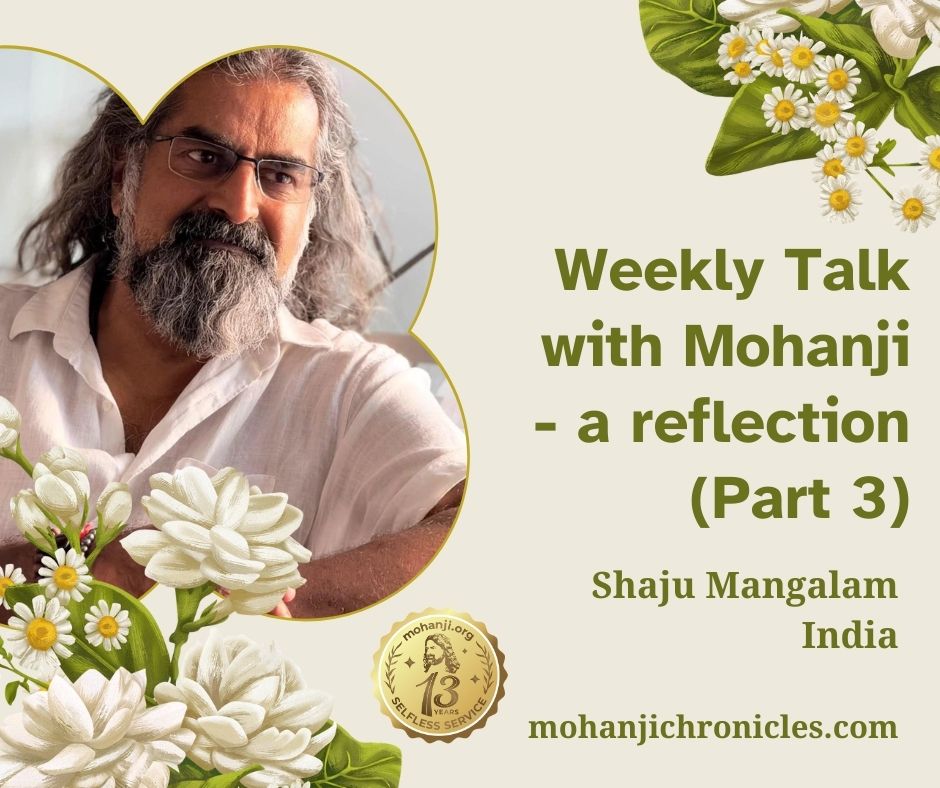by Shaju Mangalam, India
31st August 2025
The weekly session began with Mohanji quoting a timeless and powerful verse from the Bhagavad Gita:
यदा यदा हि धर्मस्य ग्लानिर्भवति भारत ।
अभ्युत्थानमधर्मस्य तदात्मानं सृजाम्यहम् ॥
परित्राणाय साधूनां विनाशाय च दुष्कृताम् ।
धर्मसंस्थापनार्थाय सम्भवामि युगे युगे ॥
This profound shloka, spoken by Lord Krishna to Arjuna on the battlefield of Kurukshetra, carries within it the eternal promise of divine intervention. Krishna declares that whenever dharma (righteousness) declines and adharma (unrighteousness) rises, He descends to restore balance—to protect the virtuous, to destroy the wicked, and to re-establish the eternal principles of truth and justice. Mohanji used this verse as the foundation for his reflections. He narrated the story of the Mahabharata war, where Krishna, though never wielding a weapon, became the guiding force who ensured the Pandavas’ victory. His presence, clarity, and wisdom became the decisive factors. Through this narration, Mohanji reminded us that dharma is not a rigid doctrine confined to scriptures. It is a living principle that flows through justice, compassion, and balance in life.
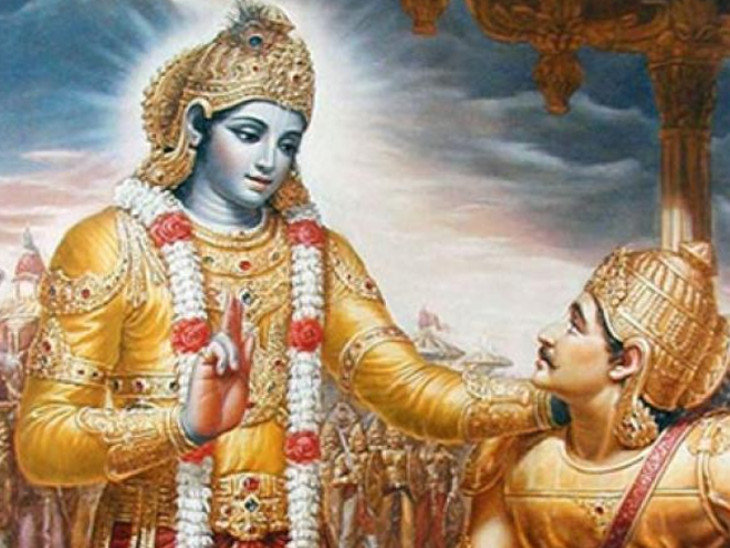
PC: Google images
Mohanji explained that towards the end of his earthly life, Krishna foresaw that his very own people—those who had been nurtured by his presence and values—would one day decline into arrogance, greed, and destruction. They would dismantle the very foundation of dharma that he had worked to preserve.
Krishna, however, was neither disturbed nor surprised. With his all-encompassing vision, he foresaw the arrival of Kali Yuga, the age of darkness. He calmly stated that destructive tendencies would engulf humanity. People would drift away from values, lose sight of compassion, and indulge in selfish pursuits. The age would be characterised by moral erosion, corruption, insensitivity, and widespread violence.
Yet Krishna did not leave humanity without hope. He emphasised a path to liberation even in this dark age. Those who dedicate themselves to selfless service, who stand by the helpless, and who live with compassion and consideration will attain moksha—freedom from the cycle of birth and death.
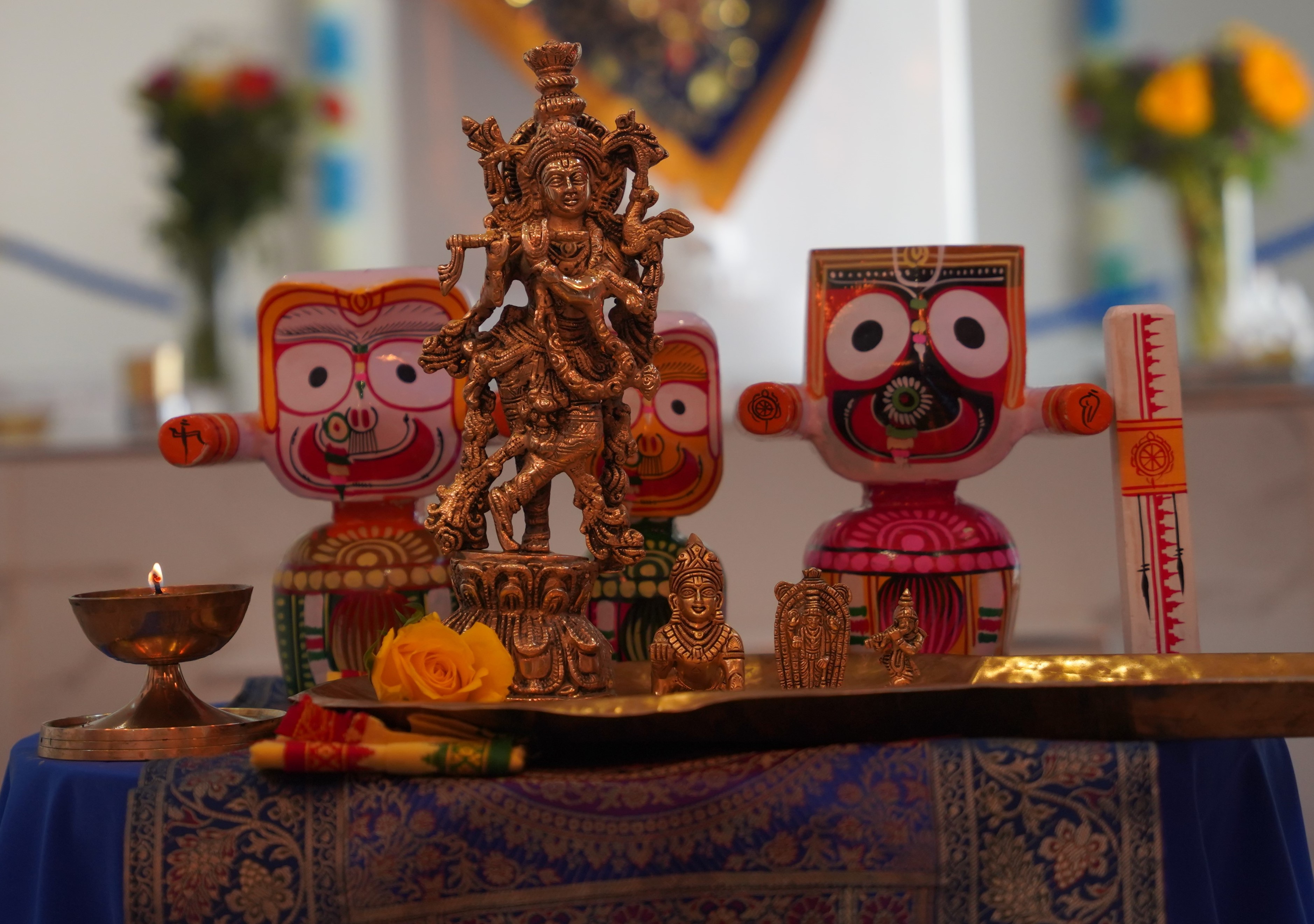
Today, we see precisely the conditions Krishna described. Greed and selfishness dominate individuals as well as nations. Conflicts, exploitation, and violence have become normalised.
But perhaps the most tragic aspect is the violence against animals and nature. Innocent beings are slaughtered daily for food, sport, and entertainment, often without a moment of recognition that they, too, are sentient beings, capable of feeling pain and deserving of respect. This systematic cruelty is not only a moral failure; it destabilises the delicate balance of the ecosystem. Environmental degradation, climate change, and the collapse of biodiversity are the planet’s karmic responses to human insensitivity.
Mohanji stressed with gravity that this cruelty towards animals is one of the heaviest karmic burdens humanity carries today. Without compassion for fellow beings, no spiritual progress can be authentic. He himself has been spearheading initiatives across the globe to advocate for ahimsa (non-violence) towards animals. He clarified that ahimsa is not a lofty ideal for a few spiritual seekers—it must become the very foundation of human life and dharma.
True spirituality, Mohanji said, is incomplete if it does not include kindness to every living being. To ignore the suffering of animals while professing devotion or meditation is hypocrisy. To live dharmically is to recognise the same spark of life in all creatures.
Life, he said, is short, fragile, and uncertain. Every breath we take is an invaluable gift. Every moment is an opportunity to align with dharma, to live meaningfully, and to contribute positively.
“Time,” Mohanji reminded us, “is the greatest currency. Once spent, it never returns.”
When life is wasted on shallow pursuits, endless entertainment, and selfish indulgence, it becomes like burning wealth for momentary sparks—leaving nothing lasting behind. Such lives accumulate unresolved karma, binding the soul to repeated births and suffering.
But when we live consciously—when each thought, word, and action is filled with awareness, compassion, and purpose—life gains depth. Productivity is not measured only in external achievements but in the inner quality of living with consciousness and kindness.
Mohanji was clear: righteousness is not about austerity or renunciation alone. It is about ensuring that every act, however small, carries meaning and adds value to life. To live in the present with awareness is to honour life. In weaving together Krishna’s wisdom, modern-day realities, and the call for compassionate living, Mohanji emphasised that dharma is not religion. It is the law of harmony that pervades existence. Dharma is reflected in how we treat others, how we respect nature, how we handle power, and how we use our time.
When dharma is upheld, life flourishes; when neglected, suffering multiplies. Importantly, Mohanji reminded us that the decline of dharma is not caused only by tyrants or criminals. It weakens each time ordinary people choose indifference over involvement, selfishness over service, or violence over compassion. Every individual choice contributes to the collective destiny of the world.
We have to embrace ahimsa (non-violence) as the fundamental dharma of this planet. Ahimsa is not merely the absence of violence. It is a state of being where one’s thoughts, words, and actions cause no harm to others. It is the awareness that all beings share the same life force, the same consciousness, expressed in different forms.
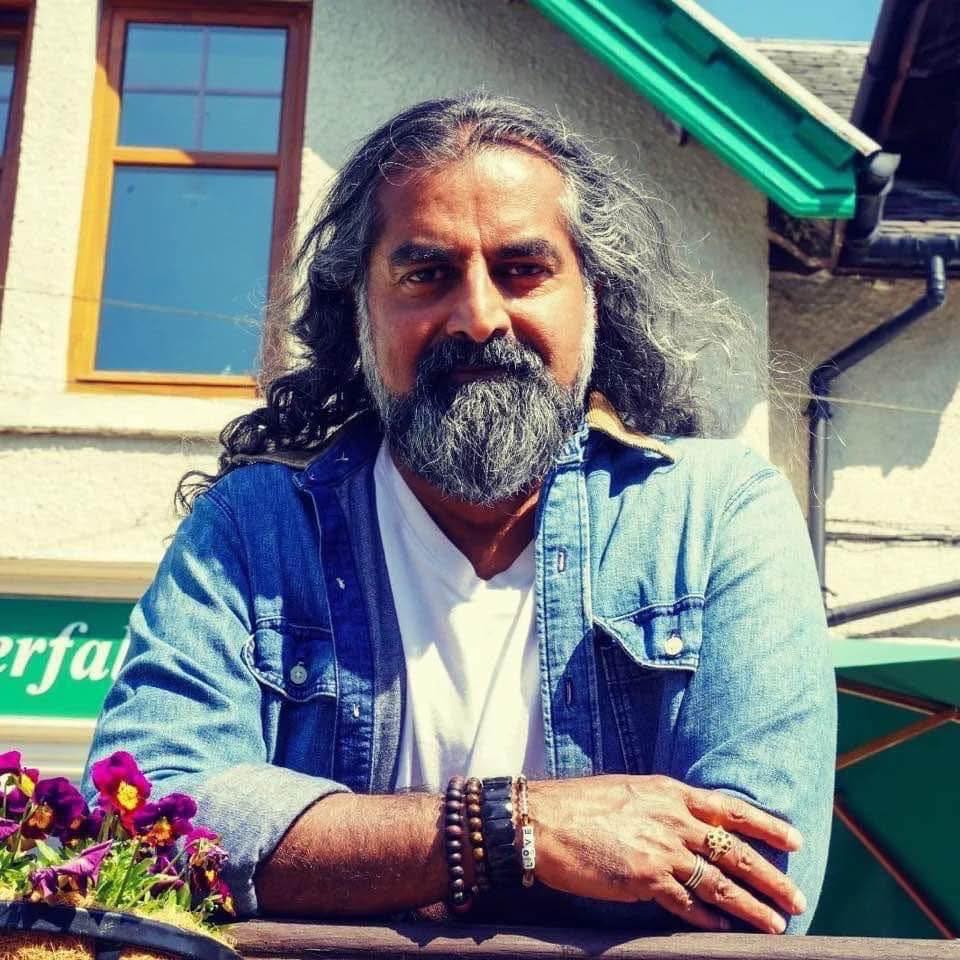
Mohanji urged his listeners and followers to actively live and spread this principle:
• To feed the hungry, including animals.
• To plant fruit-bearing trees and protect the environment.
• To speak kindly and offer comfort.
• To stand with the helpless.
No act is too small. When done with sincerity, each act becomes a powerful step in restoring dharma.
As I reflected on the talk, I was struck by the continuity of Krishna’s promise and Mohanji’s guidance. From the battlefield of Kurukshetra to the chaos of today’s world, the message remains unchanged: righteousness must be upheld, compassion must be practised, and life must be lived consciously.
The darkness of Kali Yuga may feel overwhelming. Yet Krishna’s assurance and Mohanji’s reminder shine as beacons: those who stand by the helpless, those who live with compassion, will never fall back into the cycle of suffering. Their souls will attain liberation.
The real question, then, is not when will God descend again? The real question is: Will we rise to embody divine qualities of compassion, service, and non-violence in our own lives?
If we live with these values, then each one of us becomes a small but vital restoration of dharma. And perhaps, this is the truest purpose of human life.
Thank you, Mohanji.
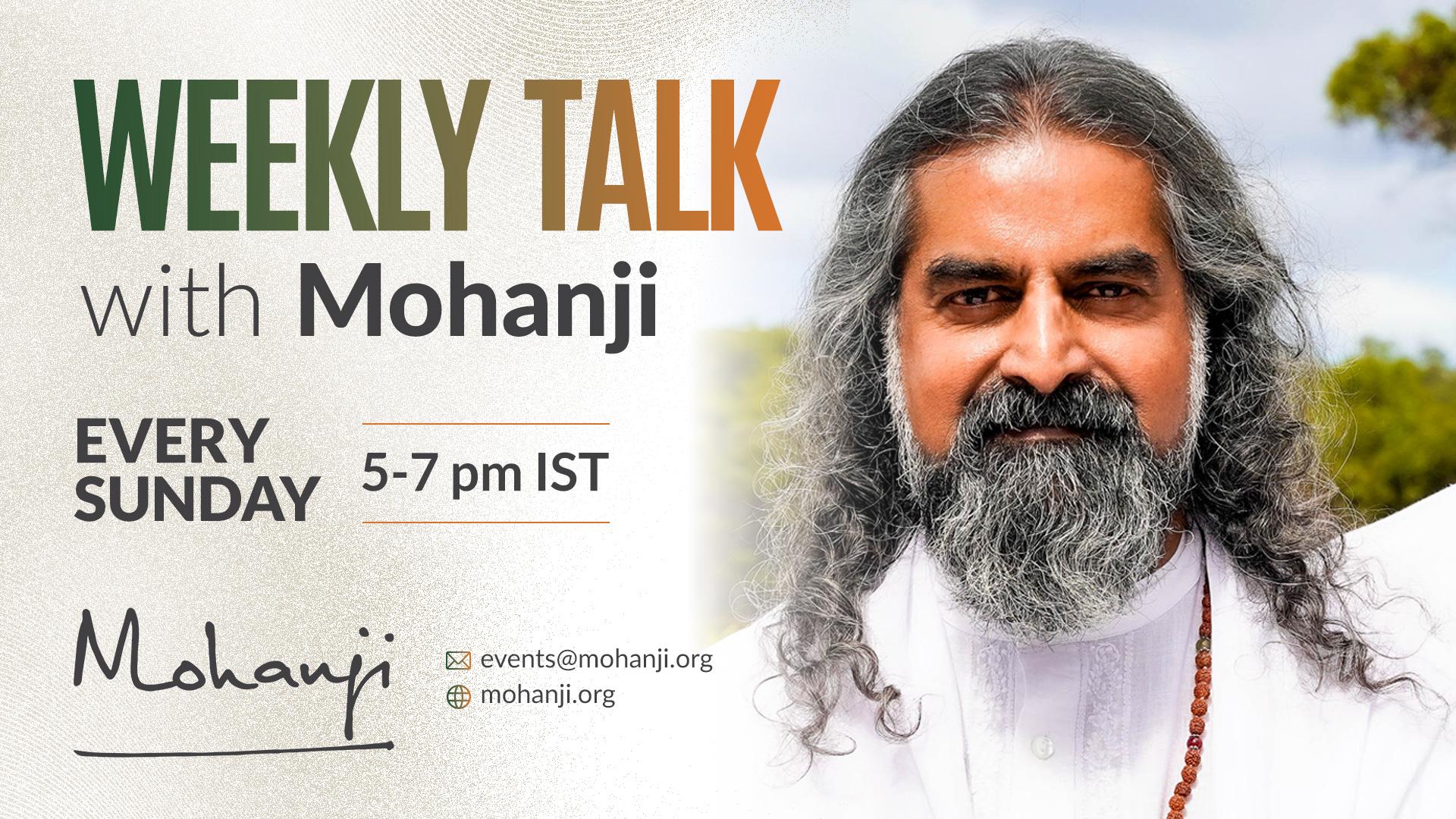
Click here for registration for Weekly talk with Mohanji
|| JAI BRAHMARISHI MOHANJI ||
Edited & Published by – Testimonials Team, 3rd September 2025

